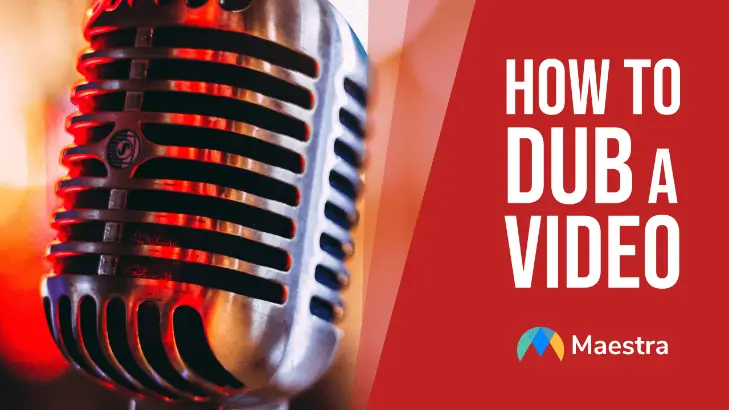How to Dub a Video

What You Need
Before you start creating your video voice over, there are some things you need to have ready:- A script and dialogue list
- The original video file and audio file from the video.
- Editing software
- A microphone or recording booth
Record Your Voice Over
Once you figure out what you will say in your voiceover, it’s time to record your voiceover. As you watch the video in your video editor, use your microphone to record an audio file. This process can be challenging. One thing that can help is to break up the recording into several small sections. That way, if you mess up, you can re-do a smaller section, and you won’t have to start over from the beginning. Take your time to ensure that you nail the voiceover the way you want. You can always record again if something doesn’t sound quite right.Add the Audio
Once you have saved the audio files, add them to the audio track in the video. You may need to edit or remove the original audio of the video depending on your video goals. You can then edit the video and audio to your liking. Make sure the audio syncs with the video how you want it to, and that the voiceover has the intended impact.Review
Before finalizing your video, review it. This step is always important, but it’s even more important when altering the audio track. You want to ensure the video meets your expectations overall, especially that the voiceover and the video match up correctly. Watch your entire video all the way through. Make notes of any necessary changes. Then, go back and make the alterations. Of course, re-watch and repeat the review each time you make changes.Dubbing the Voiceover
After creating your voiceover, you may want to dub it into another language. This can make it accessible for non-English speakers, allowing your content to reach a broader audience. But if you don’t speak other languages, how can you dub the video? Keep in mind that a bad video dub will only hurt your video. It can look comedic and low quality if not done right. The best video dubbing matches the cadence of the original audio. Here are a few options for dubbing videos:- Translate the script: Translate the original audio script into the desired language using translation software or a professional. You can also “localize” the script to adhere to the other language’s local dialect. Then, repeat the voiceover process with the translated script. Both of these can be costly and time-consuming, especially for multiple languages.
- Hire a voice cast: You could also hire a voice actor who is a native speaker of the desired language. They can convert your voiceover into an accurate dub. But imagine having to do this for multiple languages. The cost will really add up.
Automatic Video Dubbing with Maestra
The easiest way to generate high-quality video dubbing is with Maestra. Our automatic voiceover tool can convert your audio into over 30 languages! It’s very simple to use our AI-powered video dubbing tool. Here’s how it works:- Upload your original video file. We accept many video file formats and audio formats.
- Choose the audio language
- Upload your transcription file
- Translate to over 30 languages
- Preview the generated transcription file
- Choose the voices for your voiceover
- Export your voiceover in any format
